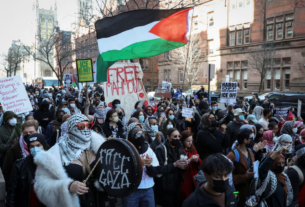Panama is holding hundreds of people who were deported from the United States after they failed to meet entry requirements. These individuals, mostly from Central America and the Caribbean, were sent to Panama where they are being held in a hotel. Many are seeking to return to their home countries or continue their journey to the United States.
“I’ve been here for days with no clear direction,” said one of the detainees, a Honduran migrant. While some wait for transportation or processing, others fear that their dreams of reaching the U.S. will never be realized. The situation has raised questions about Panama’s role in the deportation process.
The United States has been working with other countries to manage illegal immigration. Panama, as a transit point for migrants, has become involved in the deportation efforts. The government says it’s doing what it can to support those affected by the process.
Many of those held in Panama are families with young children, looking for a better life. They’ve endured long journeys, often risking their lives to escape violence and poverty. Once in Panama, they face a new set of challenges, including limited resources and a lack of support.
“You don’t know when you’ll leave or what comes next,” one deported migrant shared. The uncertainty has left many feeling lost and anxious. Panama’s authorities have not provided a clear timeline for when these people will be able to return home or continue their journeys.
Panama is working with international organizations to provide aid. Groups like the Red Cross have stepped in to offer food, water, and basic medical assistance. However, with the number of people growing daily, the situation is quickly becoming overwhelming for local authorities.
The cost of holding these migrants has become a burden on Panama’s resources. Authorities have said they are trying to balance human rights with logistical challenges. The detainees, meanwhile, are left wondering how long they will remain in limbo.
Many migrants are also concerned about their safety while in Panama. Some report being threatened by other detained individuals, adding another layer of fear to an already uncertain situation. Panama’s government is working to address these concerns but struggles with limited options.
“The longer we wait, the more we worry,” said another migrant in the hotel. Even those who are ready to return home face complications. Some migrants lack proper identification or have been unable to contact family members to make travel arrangements.
Immigration experts say Panama is facing an unprecedented challenge. “Panama has become a major crossroads for migration, but its resources are stretched thin,” said one expert. The situation calls for cooperation between nations to ensure humane treatment of migrants.
While the U.S. has been active in deporting migrants who don’t meet entry requirements, critics argue that it places too much burden on countries like Panama. They say that without international support, these countries will struggle to handle the flow of migrants. It’s clear that the crisis is global, and solutions need to involve everyone.
The United Nations has called for more solidarity among nations to deal with migration. They have urged governments to take a more balanced approach that provides protection while addressing security concerns. Panama’s experience serves as a reminder of the importance of working together.
Migrant advocacy groups are pushing for better treatment for those caught in this cycle. They demand that governments provide fair and efficient processes for migrants seeking asylum or legal entry. The current system, they argue, is failing to meet these basic human rights.
The situation in Panama is evolving rapidly, with many migrants unsure of what the future holds. As governments continue to negotiate, the hopes of these people for a better life are being put to the test. Panama’s role in this crisis highlights the need for cooperation and more compassionate immigration policies.




